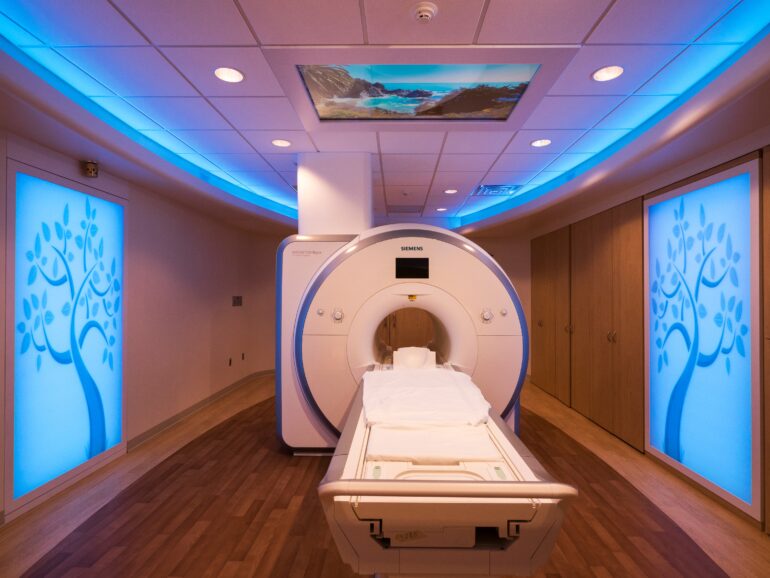TL;DR:
- Twinn Health, a British health tech startup, introduces an AI platform for early disease detection in MRI scans.
- The platform analyzes imaging biomarkers, revolutionizing disease diagnosis and treatment decision-making.
- Backed by a $500 million venture capital fund from Saudi Aramco, Twinn Health aims to lead in longevity and preventive healthcare.
- Traditional MRI scans focus on a single diagnosis, but Twinn extracts additional insights, enhancing physician analysis.
- Twinn primarily targets metabolic disease, detecting hidden fatty deposits around organs as indicators of heart disease.
- Early trials show a remarkable 95% accuracy rate in 2021, with predictions of metabolic dysfunction half a decade in advance.
- Twinn plans to secure more patents, address additional medical conditions, and accumulate data points to demonstrate scalability.
- The company aligns with the growing interest in longevity and envisions itself as a diagnostic platform supporting healthy longevity clinics.
- Seeking FDA approval, Twinn aims to expand into the American market, followed by a focus on the Middle East.
- With support from angel investors and experts, Twinn Health prepares to combat age-related frailty and liver disease, seeking further funding for expansion.
Main AI News:
In the realm of health technology, a pioneering British startup has taken a giant leap forward with the introduction of an ingenious artificial intelligence (AI) platform capable of scrutinizing MRI scans for early disease detection. Twinn Health, the driving force behind this innovative approach, leverages imaging biomarkers to revolutionize decision-making in disease diagnosis and treatment.
Backed by a colossal $500 million venture capital fund from Saudi Aramco, Twinn Health is at the forefront of longevity and preventive healthcare advancements. MRI technology has long been a game-changer in the healthcare industry, but its full potential for disease detection and longevity enhancement has remained untapped—until now.
Traditionally, MRI scans have been confined to providing a single diagnosis, resulting in a limited scope of analysis. For instance, a patient with kidney stones would undergo an MRI, the condition would be diagnosed, and the data would then be archived, seldom to be revisited. Twinn Health’s visionary founder and CEO, Wareed Alenaini, reveals the pivotal role the company plays in this scenario: extracting additional insights from MRI scans that may hold crucial information beyond the primary diagnosis.
The synergy of AI and MRI technologies drives Twinn Health’s mission to usher in a new era of healthcare—one focused on the early detection and management of age-associated diseases. The company has set its sights on combating age-related frailty and liver disease, aiming to transform chronic disease prevention into a scalable reality.
Dr. Wareed Alenaini, with an illustrious bioimaging doctorate from Imperial College London, lays the foundation for Twinn Health’s breakthrough while studying patterns in MRI images and their correlation with disease progression.
Metabolic disease takes center stage in Twinn’s endeavors, encompassing diabetes, high blood pressure, and obesity. These conditions not only increase the risk of severe health issues like coronary heart disease and stroke but also serve as indicators for potentially harmful hidden fatty deposits around organs—a critical factor in heart disease detection, even in seemingly healthy individuals.
The results of early trials have been nothing short of impressive, with a staggering 95% accuracy rate in 2021. Subsequently, these findings were validated through real-world data in collaboration with NHS physicians in the UK during 2022. Twinn’s patented AI model boasts the ability to foresee metabolic dysfunction up to half a decade before its onset—an extraordinary feat that holds tremendous promise for the future of healthcare.
But Twinn Health is far from resting on its laurels. Driven by a commitment to excellence, the company aims to secure four additional patents, tackle three more medical conditions, and accumulate a million data points, solidifying the platform’s scalability and accessibility.
The world’s growing fascination with longevity perfectly aligns with Twinn’s vision and aspirations. As the longevity field evolves and healthy longevity clinics emerge, Twinn sees itself as the quintessential diagnostic platform, offering unparalleled support for this healthcare frontier.
Dr. Alenaini asserts that Twinn Health’s immediate focus lies on securing FDA approval for the American market, but the company has its sights set on the Middle East—a region experiencing a significant push towards longevity.
Guided in part by the wisdom and support of Saleh Al Harthi—an angel investor in Twinn and chairman of the Medical Committee of the Saudi Football Federation—the company is preparing to target additional age-related diseases, including frailty (sarcopenia) and liver disease.
Conclusion:
Twinn Health’s AI-driven platform for early disease detection in MRI scans opens new avenues in healthcare. By addressing a broader range of medical conditions and demonstrating impressive accuracy rates, the company positions itself as a significant player in the growing longevity market. With support from prominent investors and a commitment to technological advancements, Twinn Health’s pursuit of FDA approval and international expansion signals exciting opportunities for investors and stakeholders in the healthcare sector.

